#hopeless-primadonna
Text
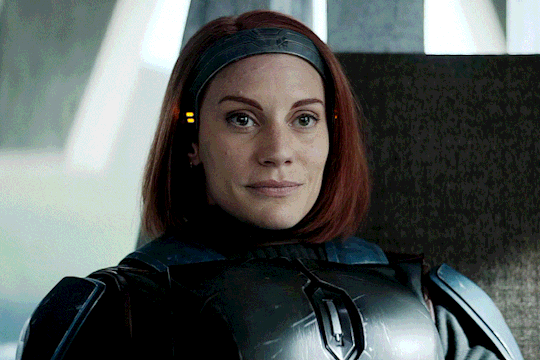

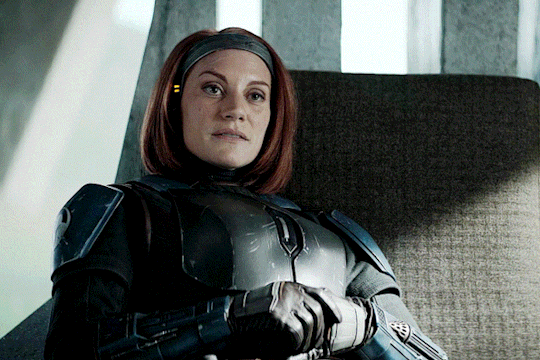




Bo-Katan Kryze + Chapter 17: The Apostate
#bo-katan kryze#katee sackhoff#bo katan#the mandalorian#star wars#swedit#can't believe one year ago bo invented sitting#no heterosexual explanation for how she sat on that throne either#din is stronger than me if i would have collapsed foaming at the mouth if i arrived on kalevala and saw her sitting like that#ANYWAY i love her i love her I LOVE HER her redemption arc means everything to meeeeee#you can see how dead and hopeless she was here ugh i'm so proud of her#also primadonna by marina came on shuffle while i was making this djdjdkd fits her well i think#bo edits#my edits#my gifs#hopefully i'll make more of her now i have some scenepacks heheh
82 notes
·
View notes
Text
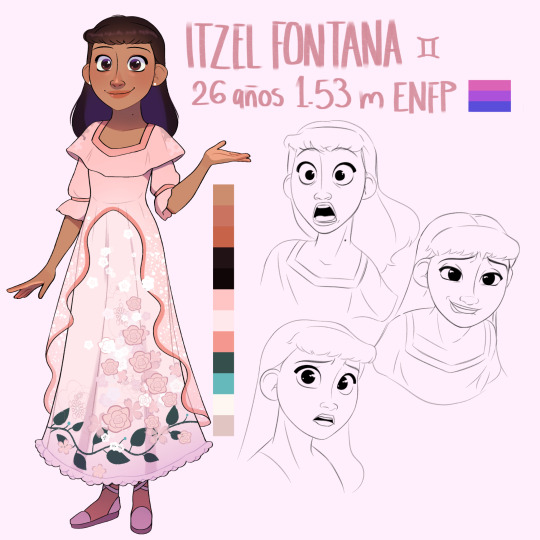
week 1: introduction
Background
Her full name is Verónica Itzel Fontana Aguilar, she's a mexican-colombian girl. Her parents arrived at El Encanto when they were kids with the group of people in which Pedro and Alma were. Her father's family, the Fontanas, are horsemen from Sinaloa, and fled Mexico during the Porfiriato. Her mother is from Yucatan, and unfortunately, was orphaned shortly before arriving in town, and she and her younger sister were adopted by the Fontana family. They work raising horses and selling them. Their business is well established in the town, and they're one of the most important families in there. Anyways, they're not friends with the Madrigals, and only interact with them whenever they need something. Itzel is the eldest of two children in the Fontana-Aguilar family.
Despite having a normal childhood, Itzel was a lonely child. Her father worked all day in the stables, so he didn't spend time with her; her mother only worked until noon 'cause she's a teacher, but she just couldn't stand her own child, and sent her to her room to keep her away from her. Itzel was a restless and energetic girl, so this affected her a lot, making her look outside her family circle for the attention that she wasn't given at home.
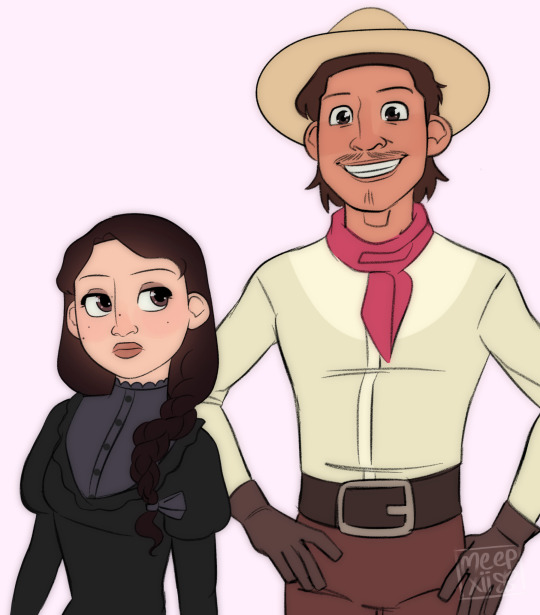
Itzel's parents in their twenties.
Personality
Itzel is a kind person and has good feelings, but she's very disconnected from her own emotions and her environment, which makes her quite impulsive. Even so, the emotions Itzel feels are very intense, and is a hopeless romantic. She collapses easily, and crying is her way of channeling her anger, happiness, or sadness. She's also a theater kid, and tends to unconsciously create her own problems by believing herself to be the protagonist of her own soap opera/novela. She really likes to grab the spotlight, and knows she's pretty, so she takes advantage of this to get what she wants. Sometimes this attitude of hers gets her into trouble.
Her savior complex and her lack of judgment when in love always make her get into toxic relationships.
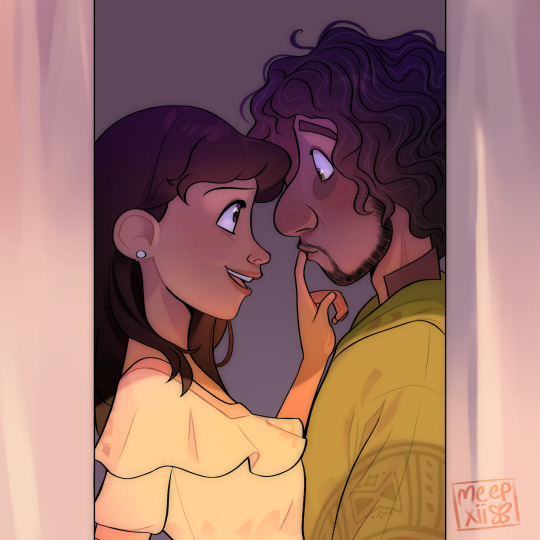
Her theme song:
Occupation
Since she was a child, Itzel showed special interest in art and knew she definitely wanted to be an artist. When she expressed her desire of devoting her life to art, her parents objected, arguing that a woman couldn't choose that occupation. However, they didn't stop her either, she did what she wanted, and fulfilled her dream anyway. She is the town muralist, and makes oil paintings as well. Her parents began to support her when they saw that she could actually make a living from it.
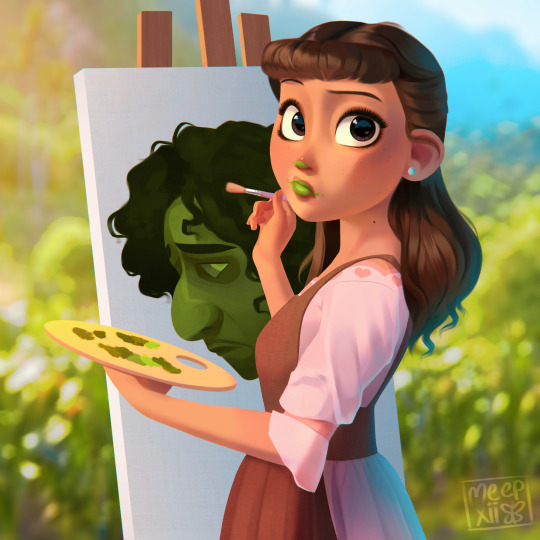
Outfits
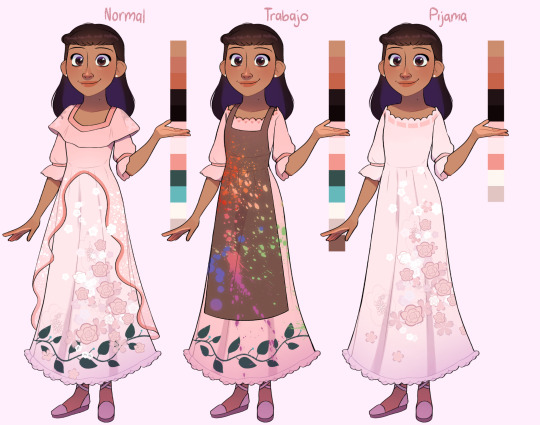
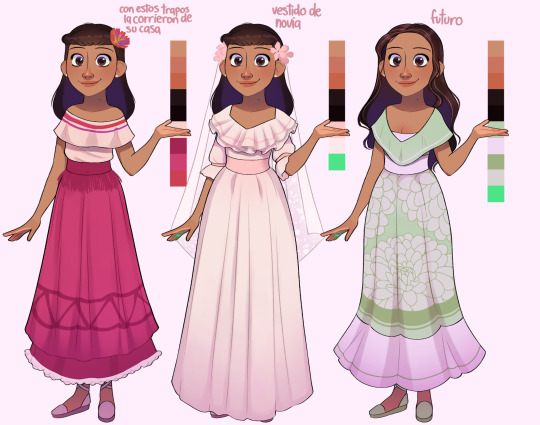
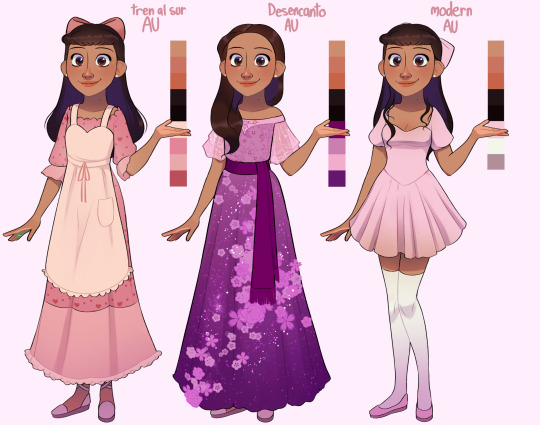
Age progression
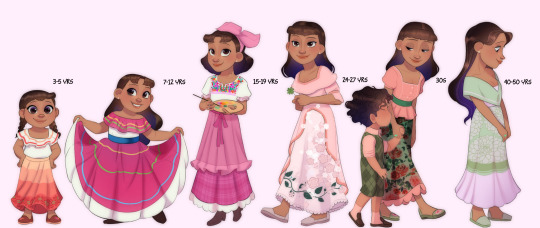
i'm super late for week one 😭 i had to fix some things on her character sheet, but here she is!
@encanto-extended-edition
#encanto#encanto oc appreciation#encanto oc#encanto oc event#oc x canon#bruno x oc#itzel fontana#original character
142 notes
·
View notes
Text
tagged by @orallech
The rules: Shuffle your On Repeat playlist and share 10 tracks, then tag 10 people
Heat of The Moment by NSP
Baby You're a Haunted House by Gerard Way
Boyfriend by Dove Cameron(Reinaeiry cover)
Curses by The Crane Wives
Hopeless Wanderer by Mumford and Sons
Strawberry Blonde by Mitski
Primadonna by Marina and the Diamonds
Mary on a Cross by Ghost
No Scrubs by TLC
Come as You Are by Nirvana
tagging: @sandushengshou @guqin-and-flute @necroscura @floral-shark @agendratum @omegal0ki and anyone else who wants to say I tagged them
#harper hush#tag games#i really thought about tagging bos other blog just to fill space#but it didnt feel fair to do it to them twice
4 notes
·
View notes
Text
My Experience with Electra Heart
When I was 11 years old, I discovered Marina and the Diamonds. I remember it like it was yesterday. I was playing in a tent outdoors with my sister, and we were listening to music we liked on YouTube. I eventually ended up clicking on the youtube thumbnail for "Primadonna Girl," off of the Electra Heart album. As soon as the first few seconds of the song played, I was instantly hooked. The line, "Primadonna girl, yeah, all I ever wanted was the world," was the gateway to my obsession with Marina and the Diamonds. I loved her Electra Heart album and so many of the songs on it, but also adored the other album the band had released, titled "The Family Jewels." Marina's lyrics about depression, sadness, and feeling hopeless really resonated with me, and I deeply connected to the upbeat music with disheartening lyrics.
After I became a fan of her music, I began to express my interests online on websites like Instagram and Tumblr. The sad girl community was at large during this time, so I experienced a lot of it first hand. At this time, I had no idea that Electra Heart was a character, and the content I saw regarding Marina's work online didn't give me any clues about it, because they were all posted by kids just like me who had no idea about the real intention of the work either! Being in this community introduced me to other artists, such as Lana Del Rey, who I began listening to and still adore to this day.
I think the difference between the two artists does have to do with how they go about creating their art. I feel like Marina's insistence on performing as a character in her Electra Heart era really held her back as an artist later on developmentally. I don't understand the point of doing a character album if the next album released by Marina and the Diamonds had almost the exact same feel and lyricism. The difference between Lana and Marina is that by staying true to herself, Lana was more easily able to evolve and grow in positive ways as an artist. I see the direct opposite of that effect with Marina's body of work.
Now that I'm an adult, I do realize the intention behind Marina's work. However, does this really change the impact of the Electra Heart album for me? No. Everything regarding her fanbase and how the music was perceived and consumed would not change whatsoever if she hadn't had the intention of being ironic. I do not tend to go back to Marina's music at all, yet I still find enjoyment in going back to some old Lana, and I adore her 2014 "Ultraviolence," album to this very day.
Marina's intentions regarding the direction of the album did not have much relevance on how her work was consumed and obsessed over online. Although many find this effect of the sad girl online community plainly harmful, I would argue that this is a double edged sword. There are way worse things in the world than posting fan content of and celebrating the dark themes in an artist's music. What I ultimately take from the situation is that the community uplifted a lot of teens in their darkest times, and the way that others choose to cope isn't really my business, despite the fact that there can be negative effects from the space as well.
0 notes
Text
My Experience with Electra Heart
When I was 11 years old, I discovered Marina and the Diamonds. I remember it like it was yesterday. I was playing in a tent outdoors with my sister, and we were listening to music we liked on YouTube. I eventually ended up clicking on the youtube thumbnail for "Primadonna Girl," off of the Electra Heart album. As soon as the first few seconds of the song played, I was instantly hooked. The line, "Primadonna girl, yeah, all I ever wanted was the world," was the gateway to my obsession with Marina and the Diamonds. I loved her Electra Heart album and so many of the songs on it, but also adored the other album the band had released, titled "The Family Jewels." Marina's lyrics about depression, sadness, and feeling hopeless really resonated with me, and I deeply connected to the upbeat music with disheartening lyrics.
After I became a fan of her music, I began to express my interests online on websites like Instagram and Tumblr. The sad girl community was at large during this time, so I experienced a lot of it first hand. At this time, I had no idea that Electra Heart was a character, and the content I saw regarding Marina's work online didn't give me any clues about it, because they were all posted by kids just like me who had no idea about the real intention of the work either! Being in this community introduced me to other artists, such as Lana Del Rey, who I began listening to and still adore to this day.
Now that I'm an adult, I do realize the intention behind Marina's work. However, does this really change the impact of the Electra Heart album for me? No. Everything regarding her fanbase and how the music was percieved and consumed would not change whatsoever if she hadnt had the intention of being ironic. I do not tend to go back to Marina's music at all, yet I still find enjoyment in going back to some old Lana, and I adore her 2014 "Ultraviolence," album to this very day.
I think the difference between the two artists does have to do with how they go about creating their art. I feel like Marina's insistence on performing as a character in her Electra Heart era really held her back as an artist later on developmentally. I don't understand the point of doing a character album if the next album released by Marina and the Diamonds had almost the exact same feel and lyricism. The difference between Lana and Marina is that by staying true to herself, Lana was more easily able to evolve and grow in positive ways as an artist. I see the direct opposite of that effect with Marina's body of work.
0 notes
Text
enjoy limitless possibilities here in celestire islands, furina focalors ( hoyoverse - genshin impact ), where you can start the new life you've always longed for. make sure you read the checklist, as we'll be sending the discord link through ims! enjoy your new dream, ziggy!

( genshin impact / hoyoverse, dupes not allowed. odessa a’zion, she/he. agender. ) ——- hey, is that ( furina focalors ) hanging around ( their favourite place in celestire )? i wonder what life is like for them, balancing working as a ( twenty-three ) year old ( former child actress / law student ) and ( vlogging & petting stray cats )? they’re notorious for being ( charismatic ) yet ( imprudent ), and i always seem to hear ( primadonna ) by ( marina ) playing whenever they walk past. they’re known around the islands for ( being the biggest cringe fail loser ever ), and they’re associated with ( the energy of a prince, always having dramatic entrances, trying so hard no matter how hopeless it feels, and hiding behind a mask ). last we spoke, they were telling me about a vision they had… something about their biggest regret being ( how scared and insecure she really is as an archon ), but it must have just been a bad dream. // — [ ziggy, 23 / est, they/them. ]
0 notes
Photo




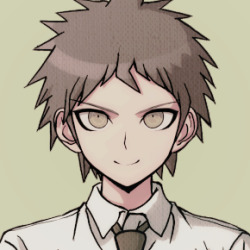




Hajime stimboard for @hopeless-primadonna !
Let me know if you need anything changed!
#mod ko#danganronpa kin#dangan ronpa kin#dr kin#kin#hajime hinata kin#stim#stimboard#food#squishy#floam#bath bomb#oouring#slime#hopeless-primadonna
13 notes
·
View notes
Note
Hey, a lot of Hallow's updates have been....messy. Hallow, are you alright?
im pretty fine, actually!i just tend to freak out a lot when feeling a large amount of emotion?like, when the mystery number called me a couple days ago, i was pretty frightened and very much energised.i assure you, there’s nothing to worry about for me.
1 note
·
View note
Note
HC: lance is a fucking cutie pie wait thats canon
me, softly: holy shit ur right
send me your favorite lance hc!
#even more canon content: keith thinks hes a cutie pie just like we do#god isnt it a great day to remember lance is cute and keith knows it and theyre in love#how do i always get to klance with these#w/e#answered#hopeless-primadonna
10 notes
·
View notes
Text
“Blair liked to think of herself as a hopeless romantic in the style of old movie actresses like Audrey Hepburn and Marilyn Monroe. She was always coming up with plot devices for the movie she was starring in at the moment, the movie that was her life.” ~ Gossip Girl, Book 1
Songs ~ Starring Role, Oh No, Primadonna Girl, Bubblegum Bitch, How To Be A Heartbreaker, Teen Idle, Power & Control, Venus Fly Trap, Genius
#blair waldorf#Blair Waldorf aesthetic#gossip girl#gossip girl aesthetic#gg aesthetic#aesthetic#it girl#alexa demie aesthetic#chase Atlantic aesthetic#marina#marina and the diamonds#bubblegum bitch aesthetic#teen idle#teen idle aesthetic#starring role#coquette#femme fatale
41 notes
·
View notes
Text
Princess Tutu Playlists
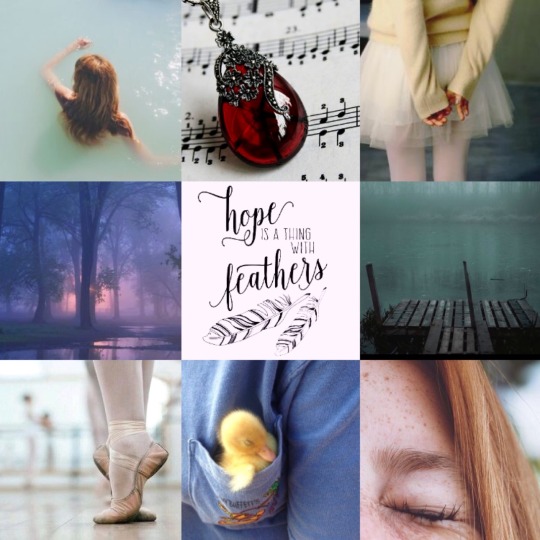
Just A Little Duck
I Wanna Dance With Somebody - Whitney Houston // Dreams to Dream - Cathy Cavadini // would you be so kind - dodie // To the Sky - Owl City // Rainbow - Liz Huett // Paper Houses (ft Barnes Blvd.) - Sidney Amos // Spell - Marie Digby // King - Lauren Aquilina // Landslide - Kaye Matriano // Warrior - foxes // Human - Ellie Goulding // What the Water Gave Me - Florence + the Machine // Mirrorball - Taylor Swift // Keep Holding On - Avril Lavigne // Everything Stays - Olivia Olson
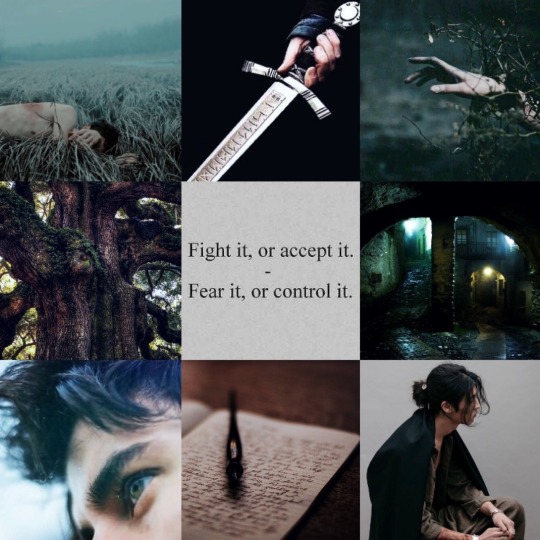
Rewriting Fate
I’m Still Here - John Rzeznik // The Kids Aren’t Alright - Fall Out Boy // Demon Host - Timber Timbre // Time of Dying - Three Days Grace // Trouble - Cage the Elephant // This is War - Thirty Seconds to Mars // Bleeding Out - Imagine Dragons // The Cave - Mumford and Sons // Song for Someone - U2 // Trade Mistakes - Panic! at the Disco // Revolution - The Score // Iris - The Goo Goo Dolls // Lose My Vision - Graveyard Club // So She Dances - Josh Groban // Starlight - Muse
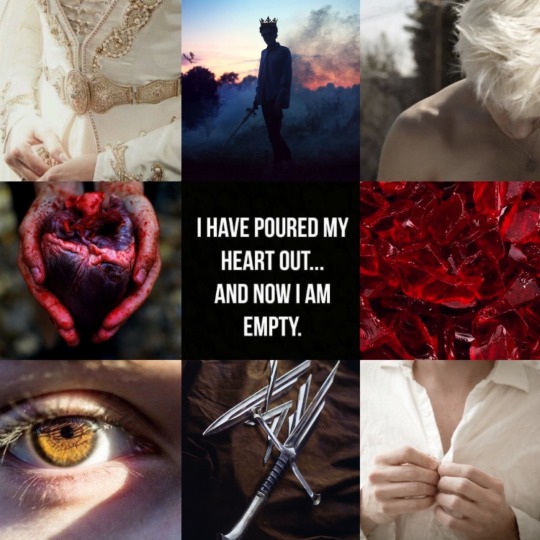
Shattered Heart
Nature Boy - Nat King Cole // Paralyzed - NF // Once - Caleb Kane // Infinitesimal - Mother Mother // feelings are fatal - mxmtoon // Hopeless Wanderer - Mumford and Sons // Run Boy Run - Woodkid // Terrible Things - Brick + Mortar // Hysteria - Muse // My Body Is A Cage - Arcade Fire // Monster - Skillet // Pieces - Red // How Far We’ve Come - Matchbox Twenty // Bloodstream - Stateless // Heroes - Peter Gabriel

Blood Of A Raven
Primadonna - Marina and the Diamonds // Heavy in Your Arms - Florence + the Machine // Brick By Boring Brick - Paramore // Queen of Mean - Sarah Jeffery // Black Magic - Magic Wands // Pacify Her - Melanie Martinez // A Little Bit Closer - Johnny Hollow // I Want You To Want Me - Children of Paradise // bury a friend - Billie Eilish // My Blood - Ellie Goulding // Smother - Daughter // A Thousand Years - Christina Perri // Shake It Out - Florence + the Machine // peace - Taylor Swift // Rainbow - Kesha
#princess tutu#princess kraehe#ahiru#ahiru arima#fakir#mytho#rue#rue kuroha#playlist#princess tutu playlist#if you have any song suggestions let me know and i can ad them#music
40 notes
·
View notes
Note
Headcanon that Asmodeus tends to get bored easily and is very capricious and fickle, and because of that he’ll try to switch things up by playing a different persona from time to time. He could go from a charming, well-mannered gentleman to a flighty, lovesick hopeless romantic to a childish, happy-go-lucky goofball to a smug, self-absorbed primadonna (primodonno?) and back again depending on how he feels that day. The denizens of the Lust Ring are used to it at this point and just play along.
Ooh I like that
6 notes
·
View notes
Note
mmm...Kh Kinsona Doodles You Say™....h m mmmm
Yesssssss ;000000(if u would like me to draw urs jussend me a Sweet Ref ;000000000000)
4 notes
·
View notes
Text
Characters: Tearing Each Other Together
After the world-sweeping success of my previous article (forty notes on Tumblr, wow!) and being driven out of my house due to mold for the second time in two months, I think the time is right to add another essay to the subject of character design and writing. But what’s left to say after having definitely solved the entire process of character writing the last time?
Well, suppose you can figure out the emotional state of one person. That’s well and good, and oddly harder for people than you might imagine. And I think the reason it’s so hard is because in virtually any show you’re not going to be given a character in a vacuum to learn that process from. They have some story, something they’re trying to overcome, and other characters they’re bouncing off of, and the actual process of conflict is more complicated than knowing who your characters are.
Hate, Love, or Indifference, It’s All A Struggle
So what’s the essence of a story? There’s some motive that’s trying to be achieved. A conflict. And I can’t stress this enough. Conflict. Because it’s one thing if you say your main character is a kid who wants to be the best Poke’mon trainer and completely another to have that be a concrete objective with a satisfying story and conclusion. Wanting to be the “best” isn’t actually conflict. It’s a dream. Being forced to travel the known world to acquire eight gaudy pins that probably cost twenty-five cents each to manufacture? That’s conflict.
And not only do you have to travel the world, you do so with a shrill red-head who explicitly hates you because you trashed her bike, and a sex-starved pervert whose life dream is to make Poke’mon mate with each other for a living. And that’s important. Without Misty and Brock, Ash’s journey is a lot less interesting for a lot of reasons. Misty calls Ash out every time he messes up, and aside from being on a watch list, Brock is a helpful older character who tells Ash, and therefore the audience, what’s what.
But let’s back up, because people understand the benefit of Brock and Misty at a basic level, but when you’re starting off, how do you know who those people should be? Well, every show, from sitcom, to comedy to drama, does its best to balance personalities against each other so there’s always some sort of conflict possible between them.
Now, “conflict” doesn’t mean they’re trying to kill each other. It could mean they’re falling in love with each other. Maybe it means they don’t have much in common but have to work together over long hours in isolation. The idea is simply that there’s something to overcome between these people. Misty thinks Ash is stupid - that’s a conflict which is often leveraged to push Ash forward. Brock, however, has a reactive role in the show, only functioning in conflict when a womanizer who grovels at the feet of ladies Ash is already helping anyway.
It’s odd because if Misty were older she would be set up very well as kind of an “opposites” romantic torture device with Brock. They’re even depicted as professional equals, which would have made their levels of expertise and experience more balanced. Had they been closer in apparent age, a “will they won’t they” romance would have fit adequately, with Brock’s constant hitting on other women serving as a major, hopeless, long-lasting roadblock to a serious relationship between them; it would work especially well because Misty is established to have an inferiority complex to her prettier sisters. It also might help explain why Brock hung around so long. But as it was, Brock’s main contribution to the inner dynamic was to act as a mediator, caretaker, and mentor.
But circling back to Brock’s dream of Poke’mon husbandry. Well, on the meta level that’s why he doesn’t leave. Because it’s not a motive, he’s not taking steps towards it, and it’s not going to happen, it’s just a dream. Until it does happen, anyway, and then they wrote him out of the show - but we’ll dig more into this later.
Balancing Imbalance
The best place to look to see good conflict set ups between characters are popular sitcoms. Consider the show “Frasier”: it ran for eleven seasons and revolved mainly around the personal spats of Frasier, his brother Niles, their dad, and the dad’s caretaker, Daphne. Frasier was arrogant, Niles was insecure, Dad was an earnest roughneck, and Daphne was well-meaning. Frasier and Niles were also elitist pricks at times so they couldn’t even always agree where to eat together, much less with their father who was happier having a burger with ketchup.
Every episode had some central motivator; an ice fishing trip, a joint investment, an awards ceremony - but these things were just catalysts to the main conflict, which was almost always something between characters. We’d seen it time and again, that Frasier and his Dad would come to blows over differences in taste. Niles would try to court Daphne while torn by his commitment to his failing marriage, over and over. But the pithy banter and the way they resolved it would always be new, so people watched this show, episode after episode, for over a decade.
And the simple beauty of it all was that each of the characters had something to do with each other. Whether it be filial obligation, lust, sibling rivalry, friction between introversion and extroversion, or taste in food, they always had some source of conflict to make a show out of. Niles and Frasier were both psychiatrists, but from different schools of thought and different working environments, so they even had chances to butt heads academically and professionally. It was rich with writing opportunities and it’s not any wonder it lasted so long.
Another sitcom, “New Girl”, which was about a group of roommates, had a good dynamic set-up between two characters, Schmidt and Nick. Nick is a messy slob and Schmidt’s a type A neat freak, creating a really obvious source of conflict to work with. But then they had a third character, Winston, who they lampshade as the token black guy.
Now, the joke that Winston is the “black friend” has pretty much no legs, so in the early seasons you see him acting as kind of a third party mediator, or maybe a wild card, and it winds up being funnier when Winston is unhelpful. So as the seasons went on, Winston gradually lost his damn mind. He becomes a cop and meets a woman so that he’d have some character growth and dynamic, but also develops into a man who would burn a building down as a prank. The writers had no idea what they were doing with him and he gradually flew further and further off the handle.
Don’t get me wrong, I really liked Winston as a character. Aside from being funny in the show, watching the writers gradually unglue him from sanity was its own meta comedy above that. I knew they were doing it on accident, but having such a good time with it that it was just going to keep getting worse. In fact a major component of the finale for the whole show is an insane thing Winston does. They wrap the show on the note, “Winston is crazy”. And it all happened because they didn’t figure out what Winston’s conflict was at the start. He didn’t have a source of conflict with anyone, so the man became a living breathing embodiment of conflict in general.
Your Story Ends With the Conflict
Now, the catch is, in any type of fiction, whether a video game, a roleplaying session, or a sitcom, the story ends when the conflict does, because if the conflict is over there’s nothing more to tell! It used to frustrate me to no end back when “My Little Pony” was popular and the other nerds on the internet used to ask, “How many times must Fluttershy learn not to be shy, or that being shy is okay? When will she overcome all that she is and eliminate the core element that creates conflict for her?”
The answer should always be that the character will learn their damn lesson when the show ends or when they’re written off it. If you are sick of seeing a character and don’t want to see them any more, the best thing to do is close out their issues, because once they have no conflicts, they have no story, and there’s no point in doing a show about them. Asking Fluttershy to stop being shy is asking to say goodbye to her, because she's a cartoon and her job is to entertain kids by being neurotic and yellow.
People think they’re so smart when they say they’d solve all a character’s problems if it were them. In the finale to the first season of Poke’mon, for example, Ash decides to gamble his whole championship run on Charizard, who’s a self-absorbed bitch of a creature that ultimately throws the match and leaves it an open question whether Ash might have won if he’d left the team primadonna sitting on the bench.
Some viewers see that and complain it’s the dumbest possible thing Ash could have done, but it’s probably one of the single most brilliant things the Poke’mon writers did in the grand scheme, because think about where it left us. Ash didn’t achieve his goal of proving he’s “the best”, but it feels like a fluke and if he got another shot, he might make it all the way. This gave the show a gateway to more episodes with Ash still having something to prove and a dumb mistake indicating he still had a lot to learn. Because he didn’t win, his story hadn’t ended.
In some cases shows can end characters just by addressing some dream goal they’ve been expressing since the first season. In the case of Brock, they intentionally removed him from the show by introducing him to some girl who was willing to work with Brock in the animal husbandry business. He’d been traveling all this time, his dream opportunity fell into his lap, and he was gone. What reason would he have to refuse, and why would anyone stop him? And of course, Brock’s dream job was incompatible with the central plot elements of the rest of the show, so that was it!
The Format Informs the Conflict
If you want to write something but you aren’t sure when it’s going to end, you need a concrete, long-term conflict that’s not just going to go away. For example, in “Scooby Doo and the Thirteen Ghosts”, there were thirteen ghosts. By design, that show should have ended after Scooby Doo found all thirteen ghosts. It actually ended earlier than that because it was cancelled, but you get the idea. When you have a finite goal, your run time is going to be finite as well.
At least in theory. In “JoJo’s Bizarre Adventure” they establish at the beginning of one season that everyone’s magic powers were based on the Tarot. Now, I don’t know the Tarot off hand, but as the show went on I knew that sooner or later they’d run out of Tarot cards, and in my mind I assumed the season would be over when the Tarot ended. But then I got a good chuckle when a guy showed up and his powers were based on a totally different theme, because I knew the writer had realized he’d stumbled into something good and wasn’t ready to end it. He invented a cheap excuse to keep going! And I think if “Scooby Doo and the Thirteen Ghosts” had been successful they’d have managed to unleash a whole lot more than thirteen ghosts because Hannah Barbera was not exactly a studio with a lot of shame.
Character conflicts like those in sitcoms are a great way to have conflict perpetually, because people don’t really change that much and there’s no reason why most of the fundamental friction shouldn’t be there indefinitely. But of course, character-driven conflict is going to be secondary in an event-driven show. “Jojo” actually does have a lot of character conflict, but the plot is primarily about the battles and the journey - if all the fighting ended Jojo’s characters probably couldn’t carry a sitcom, at least not without some serious hard work, a little genius, and a touch of elbow grease.
For event-driven conflict, you’ll want to establish a target - a moving target if you don't know when the story ends, and that can be pretty difficult. Old action shows and comics used to do it by having a rotating cast of villains, so that after one was defeated another would show up tomorrow, and it was assumed these guys regularly broke out of prison, or they escaped in rocket pods, or whatever, and they’d be back later with a new goofy scheme. In these cases you tend to find reactive heroes; they patrol the streets until a lunatic in tights and a garden-themed hat shows up and transforms everyone into people-shaped topiaries somehow.
For active heroes, you need to establish something that requires a lot of structure, like Ash’s journey to win the Poke’mon League. In every country he visits, they all have this asinine rule that you have to go to eight unique locations and kick the ass of someone who disadvantages themselves with an easily-countered mono team that all have the same exact weakness. You can’t be accepted into the League if you haven’t proven you own a water Poke’mon to utterly flatten the fire gym! Let’s be real, this nonsense is probably designed intentionally as a money gate - most people run out of cash before they qualify. Either way, it ends when Ash wins the league, and he lost the league so the show could keep going.
For roleplaying games, the same rules apply. With your players, you’re either going to establish a reactive goal - an adventuring guild hires a bunch of colorful salarymen with silly accents to go to a dungeon as part of their nine to five job - or you need players to set an active goal for themselves and keep the realization of that goal beyond their reach until you’re ready to end the game.
The Active Hero Acts
In my younger years, I learned to roleplay in almost exclusively player-driven games where we were expected to come up with our own goals and pursue them ourselves, but I’ve discovered that is stunningly rare in most roleplaying circles. Your typical D&D player likes to play the salaryman with a funny accent who doesn’t have to worry about the venturous part of adventure. His boss told him to go to the Cave of Everlasting Wonders and Torturous Screams, recover the Sword of Bad Portent, and then hand it over to the department of magic items where they’ll file the paperwork to get it delivered to the patron that wanted the sword for some reason. No need to have your own motives.
But what if you want to play a crime fighter who actually, you know, busts up all the crime? Clearly you can’t just wait for crime to happen passively - you’ve got to go after people. Act instead of being reactive. Purse snatchers are small time and in a more grounded setting the guys you’ll catch by being passive are just grunts being hired out by someone - usually kids in a lot of cases. You have to seek out the bosses.
Making an active character to fit into any setting can be challenging, and I’ve seen quite a few pitfalls. I think one of the funniest motives is always “the guy who wants to go home” due to its obvious failure condition. A lot of stories are about everymen who just want to get out of trouble, but those stories end when they get out of trouble! In many books, movies, shows, or roleplaying games, you’re almost always going to find opportunities to send that guy home, and you’ll have to either conveniently ignore it, switch motives and decide not to go home, or end the whole story with going home. These characters only work where the story is happening to them and it's all out of their control.
I’ve also seen my share of the “quirky genius inventor/scientist”. When someone designs a character mistaking a dream for a motive. They dream of building a better mouse trap, you see. That’s their inner conflict. And while this is a real world conflict, it’s difficult to make it a good story because actual science and invention involves a lengthy quantity of controlled experiments. You breed hundreds of fruit flies, expose them to nicotine, and try to isolate the gene that causes nicotine resistance. It can be fascinating work at its level but sometimes the most exciting part of your day is when you give yourself a steam burn cooking the fly food. The “quirky scientist” in fiction is usually more of a mentor, and if he insists on staying in his lab doing his work then he’s not even a main character - he’s a guy who explains fruit flies to the audience and then is never heard from again. Other times he’s the asshole who invented the story’s whole problem.
I once played in a game with “the quirky scientist who wants to go home”, and man was that a frustrating ride. The game itself was about occult magic and demons, and for most of the game the scientist was experimenting with teleportation magic to go home and was focused on that above the goal of finding and eradicating demons (the game’s premise). And when he finally met a boss demon that could teleport him home to his lab, he went! We wound up retiring a character who, to be honest, was barely even interested in the main subject of the story. Had he been in a film or a show, they’d have cut the character after the first draft because he served no purpose and wasted screen time.
So how do you make sure your character has a working, proactive goal, in a nutshell? Establish a goal that can be achieved by the character within the framework of your story through action by leaving his house (or after burning his house down so he can’t go home), and then make sure the goal is big enough that it will take many broad steps to get there - those steps need to be concrete and visible, not things that would happen off-screen. Most importantly, tie that goal into the main premise of the story, so that reaching the end of the story generally may achieve what the character wants.
If You Aren’t Trying, It’s Not A Trial
Okay, I understand that last bit probably requires more unpacking. But think of it this way. There’s a writing structure referred to as the “Hero’s Journey”. Basically it goes like this: the hero is forced into adventure, he meets friends and goes through trials, he hits his lowest point, he is reborn into a better man, he ends the conflict, story over.
What I’m talking about specifically right now are the trials. The “wacky inventor” is usually presumed to do all his research off screen because most media likes to focus on the results of the invention and the conflict. But if you were to focus on the trials of a scientist, it’d actually be about procuring research grants and potentially materials. You wouldn’t watch a show about a man who checks gene A-235 for nicotine resistance in flies, then goes on to A-236, then A-237.
If I were to write a story about a researcher, here’s one thing I might do: the researcher fails to find what he’s looking for in gene A-235, and when he goes to seek a grant to look at A-236, he finds one of his colleagues has convinced the university that the protagonist’s research is a dead end. Hearing this, the researcher realizes he’s about to lose his lab, so he writes a bit of a lie into his report on A-235. He says it may prevent cancer.
Now, the protagonist is, deep down, a good man. He thinks this will generate some buzz at the university and get him more funding, but he’ll do a follow-up and show the data doesn’t hold up. After that he’ll ask for money for A-236 and everything goes back to normal. But disaster strikes. His article, which was only supposed to show up in an obscure research journal, gets picked up by a major news network and winds up being spread all over. Suddenly he’s “the man who cured cancer”.
And as he’s trying to figure out how to navigate the issue, another researcher comes out and says that under peer review, he was able to replicate the results. He too shows that A-235 cures cancer! Now the hero isn’t sure. He becomes a celebrity and simply lies about his research because he has no real data, but try desperately as he might, in private he just can’t get the results the peer review insisted were there.
He struggles and struggles, coming to blows with his colleague who’s scrutinizing his research notes. Throw in a love interest who’s impressed with what this guy did, and actually I think I’ve just described the plot of some movie I saw a long time ago about faking cold fusion. I think Albert Einstein was a supporting character in it. In my version the twist would be the peer reviewer was also trying to get a grant by lying. Point is, the central conflict of the film certainly isn’t the scientific process, it’s all the crazy crap that happened on the way from point A to point B.
The story is in the trials. If nothing changes, if the character doesn’t have to change their way of life or go through anything special, it’s either not a story or it’s not your typical story. There are plenty of experimental films or well-regarded books that can make a certain banality become interesting. Stories that explain the simple struggles of day to day living for people on hard times. But the trials, the palpable challenges, that’s really the meat of it all. When you think of what your character should be doing throughout the story, he should be going through these efforts, these steps, these trials, all in the name of whatever his broader goal is.
Where You Start Affects Where You End
It also matters quite a lot when and where characters are introduced. A lot of tales follow some basic notes, and one of the more common elements is “crossing the threshold”, which prevents your characters from going back to their life before the adventure. It’s used because it compels the characters forward, as they have no other direction they can go. It can be anything: the character’s home town is destroyed, the character commits a crime, he accepts a contract, his mother dies - so long as it prevents him from going back. It’s especially useful in roleplaying games where you really need everyone to be driving forward.
In one such roleplaying game, I got in a spat with the guy who wanted to run the game because I was trying to make a leader character, but the game master wanted to base his game around a movie he’d seen with a single main character. He’d elected another player to be that main character, and explained to me he’d be starting the game after that character had already crossed the threshold and had begun his journey. This meant that everyone else were supporting cast and could go back to their normal lives at any time, because they were coming willingly from where they were and not really facing any drastic changes to their personal status quo.
I eventually resolved not to play in that game at all, because none of the character dynamics I wanted were going to work. It was supposed to be a “wannabe” superhero game, with the premise that everyone wanted to be heroes, except one player had already started the journey and it turned out another had already reached the end of that arc and was going to play a character that had been a hero going on years before the story began. There was no plan to really reconcile the narrative clashes.
If that game were to work as it was, without me being present, then the person playing the pre-established hero would have needed to take the mentor role. The other players besides the main character would have needed to be comfortable in auxiliary roles, and the group would have to play as though they were part-way into the story. Still learning to be a team but well past the initial stages of a plot, and they’d all need to think up reasons to be in this group individually on their own, because the threshold had already been crossed and they didn’t cross it together.
The friend running the game was actually dismissive of my advice here, arguing that I was overcomplicating everything with a meta analysis of narrative and structure when all we need is a basic drive to play, and I don’t think he realized he’d set himself up with a much more complicated game and less cohesive premise by going about things as he had.
The already established hero couldn’t be the mentor because a mentor character had already been created as an NPC. The auxiliary players weren’t really informed at the outset they’d be auxiliaries - especially not me who’d wanted to play the team leader. The player who’d been designated as the central protagonist didn’t want to lead or be the central protagonist. It could have worked, but it would have taken a lot more planning and many more concessions than a typical game.
In a more recent game, I’ve got another bit of an issue with the start misleading the general goals of the players. It’s a sci-fi game, and first, one player is doing “the quirky inventor scientist”; his current stated dream is vaguely to create transhumanist technology. He also wants to play the leader, so he established himself as the most important man nobody has ever heard of. He has spies in every major institution in the known galaxy and is a genius beyond comparison. He’s currently based in a rusting pirate ship in the middle of the space boonies doing nothing with his life save being the most important man.
Meanwhile, I set up a disgraced military officer with a revenge quest against his own nation. But the pirate crew my character joined turned out to not believe in structure nor leadership and they killed their last commander to have a system of “democracy”. My structure-minded character has tried to take the lead and drive us forward, but he runs into general deconstructive resistance and the “quirky scientist” wants to be the leader, but hasn’t yet expressed self-motivated goals.
It’s not exactly my most harmonious game and there’s quite a lot going wrong here, but here’s how it could have worked: first, establishing that the crew of the pirates respects no leadership places the entire crew in the precarious position of being “chickenshit” at the outset. That kind of incohesiveness is why a band of rogues gets easily defeated; it’s not the behavior of scrappy men of action, but hopeless men of inaction. A corrupted “democracy” collectivises failure while awarding success to whoever actually has the most power in the group structure - it protects the weak leaders from responsibility and disincentivizes good work by allowing those same men to reap rewards while offloading the burdens to those lower on the ladder. In essence, “If things are screwed up, blame the democracy. If things are good, I did it.”
What should have happened was the “quirky scientist” should have been in charge to start with, because otherwise he has no reason to be on board the ship. He’s the most powerful man in the galaxy, after all. If it were because he was financing the pirates to go on raiding and salvage missions relevant to his research, then it would make sense. He’d have a purpose and a position of leadership just as the player wanted. It would also establish the pirates have some command structure and a level of respect for it that allows them to function.
And the power struggle between the disgraced officer and the scientist? Perfectly reasonable character conflict that would drive actual, meaningful roleplaying and story. The scientist may bankroll the operation but the officer is the tactical talent and the two pull in opposite directions, as power-hungry men often do.
However, the opportunity to start with a sensible and meaningful social dynamic has passed, and on top of that the “quirky scientist” keeps his galaxy-wide power a secret, so it’s all kind of messy and “badly written” in the sense that most audiences would be generally rooting for the crew to fail, and they’d find the grand reveal of the scientist’s galactic power to be frustrating and unrewarding because it’s more of a plot hole than anything. So close on so many counts and yet so very far, and the opportunity to pull it together eventually is present but a more challenging and uphill battle than getting it right at the outset.
In The End, Did We Even Learn Anything?
Creating a character is easy, in my opinion. Creating a working story with a group of self-driven characters can be a lot harder. This is especially true of roleplaying games or of cooperation with multiple writers, where you need to be on the same general page with a committee. It can help a lot to establish the exact conflicts at the beginning, but as can be seen with Winston from “New Girl” or the later seasons of “My Little Pony”, what you have can morph beyond your control as things go on.
Sometimes you never had control in the first place. Sometimes you lose control because you conclude the original conflict of your story and struggle to find a new one - the brand is too successful to let go. Maybe an executive comes in and injects an idea that throws the entire balance of everything totally out of whack and now nothing works. Sometimes your friend thinks story structure is overrated. It’s a difficult juggling act.
So at the end of this essay did we even learn anything? It depends a lot on what you’re trying to do and what you wanted to learn. If you’re the more typical Dungeons and Dragons group, you don’t need to think much about this. Just make your characters and passively react to activities handed out by Dungeons, Dungeons & Co - your conflict is event-driven. Are you writing a sitcom? Well, balance a tangled web of conflicting character habits and write the ensuing disaster. Want to make a complex film about a group of highly motivated, proactive people with sophisticated individual goals that ultimately converge while still respecting their rich, conflicting, inner politics, and do all that writing as part of a team? Well, good goddamn luck, but with the right start and enough care you can make it happen.
34 notes
·
View notes
Photo

take on the world: songs you listen to on a summer road trip with your friends, some nostalgic some new, not a care in the world as you cruise down the highway, singing at the top of your lungs.
hopeless wanderer - mumford & sons - spun - grouplove | ends of the earth - lord huron | classy girls - the lumineers | side effects - jade bird | heroes - david bowie | anna sun - walk the moon | sweet disposition - the temper trap | could have been me - the struts | i wanna get better - bleachers | summertime - my chemical romance | alright - super grass | you know it - colony house | buttercup - jack stauber | pumpin blood - nonono | a-punk - vampire weekend | primadonna - marina | undercover martyn | two door cinema club | a dust land fairytale - the killers | cocoon - catfish and the bottlemen | float on - modest mouse | carried me with you - brandi carlile | harlem - new politics | when the day met the night - panic! at the disco | tongue tied - grouplove | out of my league - fitz and the tantrums | cecilia and the satellite - andrew mcmahon in the wilderness | home - edward sharpe & the magnetic zeros | dog days are over - florence + the machine | reflections - misterwives | tear in my heart - twenty one pilots | sleeping with a friend - neon trees | kiss this - the struts
#music#playlist#mood#mood playlist#spotify#spotify playlist#drive#roadtrip#friends#aesthetic#driving
12 notes
·
View notes
Text
CHARACTER INTERVIEW INTERVIEW WITH A VAMPIRE
▌real name: Vinzenz Rieger
▌single or taken: Both?? This blog is multipship, so it depends on the context.
▌abilities or powers: Due to his vampirism, he can see very well in the dark, he can sense auras and pick up on peoples’ emotions, he can turn into a bat (I changed this because he originally couldn’t), he can hypnotize people, on full moons, his strength doubles, and if he gets angry enough, his eyes glow a bright red.
▌eye colour: Crimson
▌hair colour: Black
▌family members: Both parents, paternal uncle, and extended family.
▌pets: A bat named Lestat.
▌something they don’t like: The sun, beaches, religion(s), onions, societal bullshit.
▌hobbies/activities: playing the piano/harpsichord/organ, writing, opera, visiting abandoned buildings, teasing the ever-loving fuck out of people .
▌ever hurt anyone before: It’s in his contract at Mann Co, so yes.
▌ever killed anyone before: It’s in his contract at Mann Co, so yes.
▌animal that represents them: Either a cat or a bat.
▌worst habits: Sticking his nose into things he shouldn’t, turning into a Karen, forcing his beliefs on people
▌role models: Dracula His parents
▌sexual orientation: Polyam pansexual
▌thoughts on marriage/kids: 100% marriage, 50/50 on kids. He wouldn’t mind marrying his partner(s), and the hopeless romantic in him would make it a fairytale wedding. Kids, he....doesn’t really care too much about, but perhaps with a little persuasion, he might be swayed to have them. The day he becomes a father will be one that he’ll never forget, should it happen.
▌fears: Religious objects, bodies of water, losing his loved ones (especially his mama), angry mobs, fire, being found out (about his vampirism).
▌style preferences: 19th century/Victorian attire
▌someone they love: Again, depends on the context, but @fraulinekritzkrieg is one of them!
▌approach to friendships: He flirts with anyone and everyone, and he treasures his friends that put up with his dramatic ass.
▌thoughts on pie: Bangin’, but he likes cake a little more
▌favourite drink: Red wine with blood
▌favourite place to spend time at: In the common room, bars and restaurants, his room, in the park at night
▌swim in the lake or in the ocean: Neither, he can’t swim and he’s afraid of (open) water.
▌their type: Someone who can put up with his antics and challenge him, someone who can match his passion and ferocity, as well as someone who is soft and who can be there for him when he’s struggling. He tends to go for people similar to his personality, as well as shy and timid people, and stoic, hard-to-crack people.
▌camping or indoors: Indoors. He’s a primadonna, and has no knowledge of outdoor smarts, especially when it comes to camping.
Tagged by: @fraulinekritzkrieg (thank you, dear!)
Tagging: @klein-klaus, @pauling-charlotte, @grimmmedic, @diannabridden, @thebleuspider, @life-is-a-cabernet, and anyone else who wants to do this!
3 notes
·
View notes